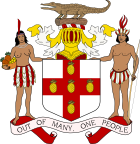Supreme Court
The Supreme Court has unlimited original jurisdiction in criminal and civil cases. The Chief Justice of the Supreme Court is the head of the judiciary (currently Bryan Sykes). Besides the Chief Justice, the court is composed of the Senior Puisne Judge and additional Puisne Judges, with their number established by Parliament. In response to increasing case load, Parliament in 2008 increased the number of spaces on the Supreme Court from 26 to 40 [7] with the new spaces filled over time by appointment of new judges.
The Supreme Court has a number of divisions, in which a subset of the justices hear specific types of cases. The Circuit Court is the division for criminal cases, holding sessions in the individual parishes. The Justices of the Peace (Appeals) Act states that the "Circuit Court for every parish in this Island shall be the Appeal Court for matters arising in every such parish." [8] Other divisions of the Supreme Court are the Gun Court, the Commercial Court, the Revenue Court, and the Family Court. In the civil division of the Supreme Court the judge sits alone without the jury, except in cases of defamation. The Supreme Court also serves as a Constitutional Court for Jamaica.
Parish Courts
Each parish has a Parish Court with power to hear civil and criminal matters. The jurisdiction of each court extends one mile beyond the border of its parish. Severe crimes such as rape, treason, and murder are not tried by the Parish Courts, but are referred to the Supreme Court after a preliminary hearing.
The Parish Courts also have a number of divisions, including the Family Court, Coroners Court, Tax Court, Juvenile Court, Traffic Court, Small Claims Court, Night Court, Drug Court, and Gun Court (Parish Court Division).
Resident Magistrates or Parish Court are appointed by the Governor General on recommendation of the Judicial Services Commission. They are assigned to a parish by the Chief Justice and report to the Chief Justice. The minimum qualification for the Resident Magistrate is five (5) years at the Bar.

The Judicial Committee of the Privy Council (JCPC) is the highest court of appeal for certain British territories, some Commonwealth countries and a few UK bodies. Established on 13 August 1833 to hear appeals formerly heard by the King-in-Council, the Privy Council formerly acted as the court of last resort for the entire British Empire, and continues to act as the highest court of appeal for several independent Commonwealth nations, the Crown Dependencies, and the British Overseas Territories.
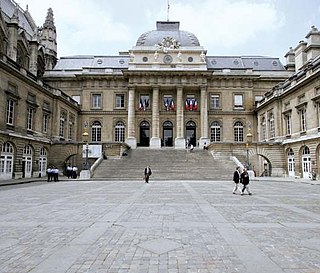
The Court of Cassation is one of the four courts of last resort in France. It has jurisdiction over all civil and criminal matters triable in the judicial system, and is the supreme court of appeal in these cases. It has jurisdiction to review the law, and to certify questions of law, to determine miscarriages of justice. The Court is located in the Palace of Justice in Paris.
The courts of England and Wales, supported administratively by Her Majesty's Courts and Tribunals Service, are the civil and criminal courts responsible for the administration of justice in England and Wales.

The Caribbean Court of Justice is the judicial institution of the Caribbean Community (CARICOM). Established in 2005, it is based in Port of Spain, Trinidad and Tobago.

The judiciary of Australia comprises judges who sit in federal courts and courts of the States and Territories of Australia. The High Court of Australia sits at the apex of the Australian court hierarchy as the ultimate court of appeal on matters of both federal and State law.

The Supreme Court of Tasmania is the highest State court in the Australian State of Tasmania. In the Australian court hierarchy, the Supreme Court of Tasmania is in the middle level, with both an appellate jurisdiction over lower courts, and decisions made by Court to be heard on appeal by the High Court of Australia.
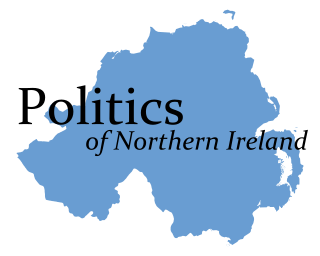
The courts of Northern Ireland are the civil and criminal courts responsible for the administration of justice in Northern Ireland: they are constituted and governed by the law of Northern Ireland.

The judiciary of Gibraltar is a branch of the Government of Gibraltar that interprets and applies the law of Gibraltar, to ensure equal justice under law, and to provide a mechanism for dispute resolution. The legal system of Gibraltar is based on English law and is a mix of common law and statute. The hierarchical system of courts includes a magistrates' court, a supreme court and a non-resident appellate court.

A supreme court is the highest court within the hierarchy of courts in many legal jurisdictions. Other descriptions for such courts include court of last resort, apex court, and highcourt of appeal. Broadly speaking, the decisions of a supreme court are not subject to further review by any other court. Supreme courts typically function primarily as appellate courts, hearing appeals from decisions of lower trial courts, or from intermediate-level appellate courts.

The judiciary of Pakistan is a hierarchical system with two classes of courts: the superior judiciary and the subordinate judiciary. The superior judiciary is composed of the Supreme Court of Pakistan, the Federal Shariat Court and five High Courts, with the Supreme Court at the apex. There is a High Court for each of the four provinces as well as a High Court for the Islamabad Capital Territory. The Constitution of Pakistan entrusts the superior judiciary with the obligation to preserve, protect and defend the constitution. Neither the Supreme Court nor a High Court may exercise jurisdiction in relation to Tribal Areas, except otherwise provided for. The disputed regions of Azad Kashmir and Gilgit–Baltistan have separate court systems.
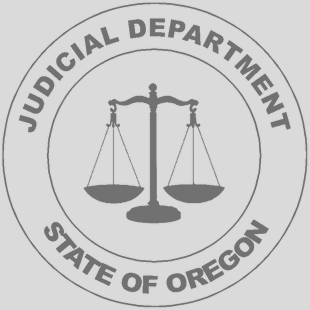
The Oregon Judicial Department (OJD) is the judicial branch of government of the state of Oregon in the United States. The chief executive of the branch is the Chief Justice of the Oregon Supreme Court. Oregon’s judiciary consists primarily of four different courts: the Oregon Supreme Court, the Oregon Tax Court, the Oregon Court of Appeals, and the Oregon circuit courts. Additionally, the OJD includes the Council on Court Procedures, the Oregon State Bar, Commission on Judicial Fitness and Disability, and the Public Defense Services Commission. Employees of the court are the largest non-union group among state workers.

The Gun Court is the branch of the Jamaican judicial system that tries criminal cases involving firearms. The Court was established by Parliament in 1974 to combat rising gun violence, and empowered to try suspects in camera, without a jury. The Supreme Court, Circuit Courts, and Resident Magistrate's Courts function as Gun Courts whenever they hear firearms cases. There is also a Western Regional Gun Court in Montego Bay. Those convicted by the Gun Court are imprisoned in a dedicated prison compound at South Camp in Kingston. Until 1999, the Gun Court sessions were also held in the same facility.

The Supreme Court of Judicature of Barbados is the highest judicial body in the country of Barbados. It is made up of the High Court and the Court of Appeals.

The Judiciary of Barbados is an independent branch of the Barbadian government, subject only to the Barbadian Constitution. It is headed by the Chief Justice of Barbados. Barbados is a common law jurisdiction, in which precedents from English law and British Commonwealth tradition may be taken into account.
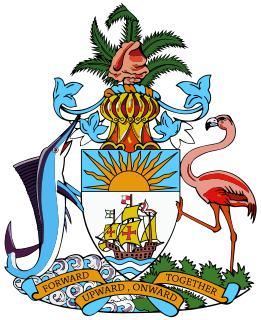
The basis of the Bahamian Law and legal system lies within the English Common Law tradition. Justices of the Supreme Court, Registrars and Magistrates are all appointed by The Governor-General acting on the advice of the Judicial and Legal Service Commission, which is composed of five individuals who are headed by the Chief Justice as their chairman. The Chief Justice and the Justices of the Court of Appeal, including the President, are appointed by the Governor-General on the recommendation of the Prime Minister after consultation with the Leader of the Opposition. Once appointed, the salaries and other terms of appointment of the Chief Justice, Justices of Appeal and Justices of the Supreme Court cannot be altered to their disadvantage. Justices of the Supreme Court can serve until the age of 65 years and, where agreed among the judge, the Prime Minister and the Leader of the Opposition, may serve until the age of 67. Justices of Appeal can serve until the age of 68 years and, where agreed among the judge, the Prime Minister and the Leader of the Opposition, may serve until the age of 70 years. The law of The Bahamas makes provisions for the appointment of 12 Justices to the Bench of the Supreme Court, inclusive of the Chief Justice, and for five Justices of the Court of Appeal, inclusive of the President. The Chief Justice, as Head of the Judiciary, is an ex officio member of the Court of Appeal, but only sits at the invitation of the President.

The judiciary of Solomon Islands is a branch of the Government of Solomon Islands that interprets and applies the laws of Solomon Islands, to ensure equal justice under law, and to provide a mechanism for dispute resolution. The legal system is derived from chapter VII, part II of the Constitution, adopted when the country became independent from the United Kingdom in 1978. The Constitution provided for the creation of a High Court, with original jurisdiction in civil and criminal cases, and a Court of Appeal. It also provided for the possibility of "subordinate courts", with no further specification (art.84).
The Judiciary of Sri Lanka are the civil and criminal courts responsible for the administration of justice in Sri Lanka. The Constitution of Sri Lanka defines courts as independent institutions within the traditional framework of checks and balances. They apply Sri Lankan Law which is an amalgam of English common law, Roman-Dutch civil law and Customary Law; and are established under the Judicature Act No 02 of 1978 of the Parliament of Sri Lanka.

The judiciary of Trinidad and Tobago is a branch of the Government of Trinidad and Tobago that interprets and applies the laws of Trinidad and Tobago, to ensure equal justice under law, and to provide a mechanism for dispute resolution.

The judiciary of British Virgin Islands is based on the judiciary of the United Kingdom. The British Virgin Islands is a member state of the Eastern Caribbean Supreme Court. The courts are organized at four levels, including the provision for final appeal to the Judicial Committee of the Privy Council in London.

The Judiciary of Bangladesh or Judicial system of Bangladesh is based on the Constitution and the laws are enacted by the legislature and interpreted by the higher courts. Bangladesh Supreme Court is the highest court of Bangladesh. The jurisdiction of the Supreme Court of Bangladesh has been described in Article 94(1) of the Constitution of Bangladesh. It consists of two divisions, the High Court Division and the Appellate Division. These two divisions of the Supreme Court have separate jurisdictions.
